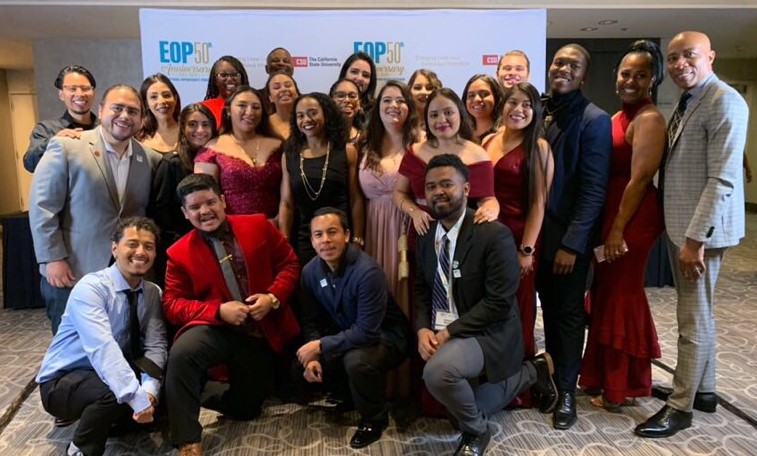By Robert Rios, News Editor
Born from the demands that roared across college campuses in the 1960s for institutional change and greater access to higher education for economically disadvantaged and minority students, the Educational Opportunity Program (EOP) has given thousands of California State University students the opportunity, resources and support to help get into college and graduate.
California State Hill’s EOP celebrated the 50 anniversary of the landmark California bill that made EOP a state-funded organization at a four-day conference Long Beach Sept. 7-10 attended by an estimated 500 representatives of all 23 CSU EOP offices.
“Most wanted to celebrate the students who fought for the program and to remind ourselves it was students who led the fight, the social justice movement, for access to higher education in the ’60s,” said Sean James, CSUDH’s EOP Director. “These students wanted to open the doors for students who were coming from oppressed and disadvantaged communities.”
EOP was created in the late 1960s in response to economic and social challenges preventing minorities and students from attaining a college education. Although California’s population was growing far more diverse, the college student population at the time was predominantly white and relatively affluent. But to create change meant work, and that work was often difficult.
CSUDH’s EOP program, which began around 1970, was launched after those at several other universities (Cal State Long Beach in 1967 was first), formed, some with great struggle.
At Cal State Los Angeles, for example, two student groups, the United Mexican-American Students and the Black Student Union, were the key actors in implementing a program to better serve under-represented minorities. Each formed in 1967 and organized rallies, protest and even a six-day camp out in tents on campus to demand support for more funding
In April, 1969, the California Legislature passed Senate Bill 1072, the Harmer Bill, which established EOP as a state-funded program. Since then, thousands of students, many of them first generation and from low-income families, have benefited from the support and services offered by the CSU
. At the conference, speakers talked about their experiences in the program and how students protested valiantly for schools to help motivate those who lacked the financial means and academic support to obtain a four-year university degree.
Former EOP student and CSUDH graduate Jaylan Hicks, now working with Toro Guardian Scholars, is an example of the program’s success.
“EOP gave me the potential to flourish and thrive,” Hicks said. “Without being in the program and my EOP peer mentor telling me the potential she saw in me, I would not be as accomplished as I am today. It] gave me the guidance and support I needed to be more open-minded to new opportunities and to become a student leader.”
Along with remembering the struggles and that created EOP and infused its past 50 years, the conference sought to remind staff members why they are involved in the program. Although 50 years James said that many of the same issues facing students today similar to those faced 50 years ago.
Workshops were held to provide professional development for the staff members to learn different support programs and academic engagement ideas provided by other EOP offices.
CSUDH hosted a workshop titled, “Let’s get intrusive; transforming the advising experience using the 8 Dimensions of Wellness. It was led by Hubert De Leon Tzic, an academic adviser for CSUDH’s EOP.
The workshop demonstrated the opportunities and effectiveness of integrating eight dimensions of wellness to understand students’ needs, such as understanding their financial, mental health and personal well-being as part of a holistic approach to advising to make sure they are prepared to handle college.
“It provides evidence as to the need of our advising approach, said Leon. “And it describes how we collect data from it to better inform us.”
That combination of remembering the past and using it to inform the present and future of EOP permeated throughout the four day conference, James said.
“Everyone came together to celebrate EOP’s 50 years of being part of the CSU,” he said.

